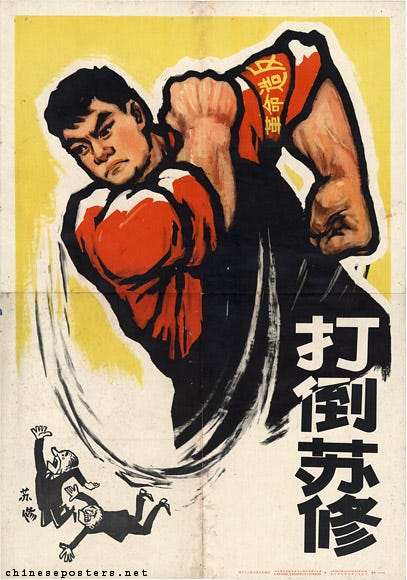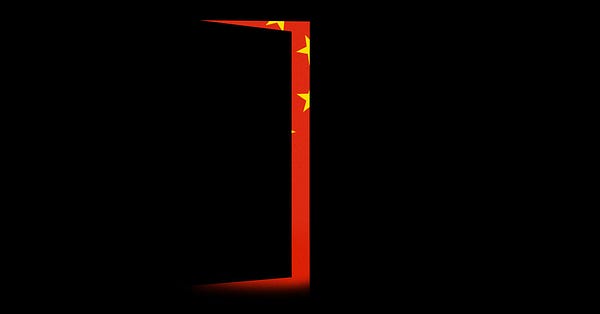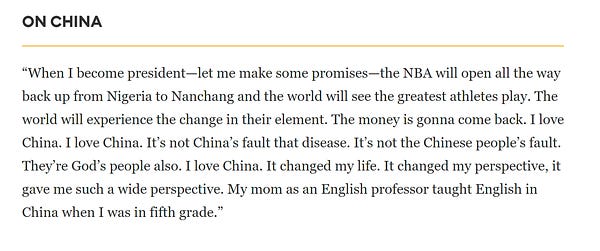To toot my own horn for a second, I believe I wrote the first article in the western press raising the alarm about TikTok’s spread back in January 2019 in Foreign Policy. I updated and added to that piece below, building up to a stab at what western countries should do in response to TikTok’s rapid growth. In short, I’m in favor of a ban as TikTok is unlikely to provide the transparency and safeguards necessary to ensure that the platform doesn’t become a playground for foreign interference.
As TikTok was expanding around the world, ByteDance’s issues around content were primarily around social norms rather than politics. But the company has also proven itself ill-prepared to respond to criticism in democratic countries. For instance, ByteDance has issued spurious YouTube copyright takedowns when called out for hosting racy children’s content and sued media outlets that publish critical reporting of fake news on its overseas operations.
Aside from being bad PR, this response also speaks to a greater disconnect. The principles a firm like ByteDance, which came up in the party-shadowed garden of the Chinese tech sector, applies to government cooperation and content policy questions abroad are fundamentally different from how the policy teams at Silicon Valley firms, filled to the brim with ex-U.S. administration officials, will do so.
ByteDance has already been repeatedly forced to bend the knee to party authority at home. Most punishingly, in April 2018 the government compelled ByteDance to shut down its popular 内涵段子 (“inside jokes”) app for good due to its “vulgar” content. In response, Zhang issued a letter of self-criticism where he said, “Our product took the wrong path, and content appeared that was incommensurate with socialist core values.” He also promised that the firm would in the future “Further deepen cooperation with authoritative [official party] media, elevating distribution of authoritative media content, ensuring that authoritative [official party] media voices are broadcast to strength.”
I heard rumors that in the leadup to this self-criticism letter, the government, without prior warning, forced senior Bytedance managers to spend days away from their families getting read the riot act about the importance of controlling content on their platform.
These nods to the party are readily apparent to users in China. It has openly given party member job applicants preference, and I noticed that after the government crackdown on ByteDance products, advertorial-style Douyin videos about the Chinese police and army started to appear more frequently—driven, presumably, by internal tweaks to the recommendation algorithm. While such actions reinforce ByteDance’s standing domestically, as its market abroad grows the firm’s connection to and reliance on the Chinese Communist Party’s goodwill comes more into focus.
Even for American firms, managing user-generated content isn’t easy. Facebook, with a high-powered U.S. policy team and a COO who worked under Larry Summers at the Treasury Department, has clearly struggled to navigate these waters. But ByteDance has problems that Western firms don’t share. The potential for Chinese government interference in ByteDance is considerable—and like other tech firms in China, there’s little the company can do about it. In such an eventuality, Russians spending a few million dollars on social media ads in the 2016 election will seem like child’s play compared to the Chinese government compelling ByteDance to tweak its algorithms to boost certain candidates’ chances.
The Chinese government is no stranger to using orchestrated networks on western platforms to influence foreign opinion and interfere in elections. The Chinese government has run massive twitter operations and surreptitiously bankrolls pro-CCP youtube channels platforms. It helped get KMT candidate Han Kuo-Yu elected and posted thousands of tweets opposing Tsai Ing-wen during this year’s race. I just don’t see how some enterprising young bureaucrat doesn’t recognize the potential power of juking TikTok’s algorithm and once that idea gets seeded, how TikTok can resist.
Further, this sort of subtle tweaking of algorithms feeding content is much more likely to go undetected than the Russian 2016 influence operations. No one is likely to notice a few extra anodyne “don’t forget to register to vote!” PSAs aimed at favored candidates’ supporters. While the Chinese government’s levels of sophistication when it comes to influencing U.S. politics are, to say the least, underdeveloped, having foreigners rely on apps for news and entertainment is a powerful potential vector of influence.
For the first few years of TikTok’s existence, Bytedance thought they could sidestep these political issues abroad by making a ‘fun-only’ app completely divorced from politics by allowing users to record just their ‘美好生活’, ‘a beautiful life’ as the Douyin tagline reads.
At first, I assumed that TikTok could be able to hold the line through bans on political advertising and by keeping activism largely off the platform. However, the Black Lives Matter movement made that stance untenable. Maybe they could through shadowbans and algorithm tweaks suppress speech on issues that aren’t at the forefront of America’s national conversation, such as discussion of China’s treatment of Uighurs. But once George Floyd was killed, it would have been impossible to suppress related content (not that they didn’t try).
For the past few weeks, I’ve been using TikTok and from a clean account and initially tried to make it feed me political content. Within five minutes of liking videos, I had a feed filled with top-notch Trump parodies. Before, when TikTok was mostly apolitical, if you wanted to steal an election by messing with the platform you had to do it more subtly by doing stuff like pushing happier videos to people you wanted to encourage to vote. But now that TikTok is chock-full of political content, and with tens of millions of daily active users in America, pushing certain videos to promote one candidate over another would be trivial. While this could probably not swing an election where Biden holds a 10+ point edge in the polls, it could certainly be the difference in close down-ticket races.
Chinese tech firms are not enthusiastic partners in these sorts of foreign-policy endeavors, and aside from the occasional offer of free office space and tax credits would generally prefer to have nothing to do with the government. Take DiDi’s initial response to police requests for data—in one instance, after twice outright refusing the request on privacy grounds, it finally simply printed out a few boxes of documents that for the police’s purposes were nearly useless. ByteDance’s CEO is surely not happy to have to issue apology letters and face mandated shutdowns of popular products.
Honestly, I feel bad for Zhang Yiming and the rest of the new generation of Chinese tech founders.
I have not met Zhang personally but have read at least a dozen Chinese-language profiles or Q&As with him. These articles, coupled with personal interactions with a handful of other prominent tech new generation CEOs have given me a sense of their personal ambitions. They were promised a China opening to the west, were all active online back when the Chinese internet was much more open than it is today, and many spent years in Silicon Valley working for top American tech firms. For them, to compete against western firms overseas is a natural evolution after saturating a domestic market, as well as the ultimate challenge for leaders who have built their companies aping the org structures and speed of Facebook circa 2009 to face off against the real deal.
The proper mental model of a Chinese tech CEO under 40 is not that of a faithful party member toiling ceaselessly to spread Xi Jinping Thought rather a nerdy engineer who worked in the Valley and daydreamed of building something as big as Sergey and Mark.
Like tech titans in SF, most would much rather have nothing to do with politics, and on the whole, are much more liberal than your average Politburo member. I have less confidence, however, in extending this model to Huawei and its CEO Ren Zhengfei, who comes from an earlier generation.
The poor guy just wants to be like Zuck.
But at the end of the day, there is very little that these firms can do to push back in a party-state environment. Surely the domestic Chinese Huawei and Bytedance government relations teams make the argument that any evidence of their firms being used to spy on foreigners or tweak algorithms to Beijing’s benefit would do irrevocable damage to Chinese firms’ international ambitions. But that risk pales in comparison to the prize of potentially swinging a US presidential election.
China’s national intelligence law gives total authority to the government to compel firms—and with no independent judiciary, even extralegal pressure is very hard to resist. CCP regulators who can take massive bites out of market capitalization at will, to say nothing of threatening the personal security of senior tech leadership that doesn’t follow their suggestions, make keeping officials at home happy ByteDance’s first priority, regardless of reputational risks abroad.
Kevin Xu has proposed the most reasonable path for TikTok to get around this dilemma, namely by open-sourcing its Role-Based Access Control to, in his words, “prove that Chinese engineers are indeed off-limits from American user data.” Personally, I’m doubtful whether it’s technically feasible to open source TikTok to such a degree as to preclude the possibility of any funny business.
But even if they make gestures toward this, the fundamental issue is a problem of trust. Given that PRC-linked information operations are rampant on YouTube, Facebook, and Twitter, I would find it very odd for them not to be active on TikTok as well.
Until ‘TikTok USA’ has enough independence to expose subversive PRC activity with the same verve that American-owned firms do, I’m not buying the separation.
But regardless, it doesn’t look like Zhang Yiming is all that interested in pursuing the open-source path, and currently, TikTok is taking the utterly unconvincing Huawei-inspired PR line of loudly proclaiming that it would never accede to Chinese government requests.
As an aside, I think the data privacy side of this is a red herring. The data TikTok sucks up doesn’t seem all that much worse than what US customers are subjected to by Facebook and Google, and thanks to the OPM hack, Chinese intelligence services have more interesting personal data than they know what to do with. Anything it could learn about individuals through their TikTok usage is probably not nearly as relevant. It’s really the election and political interference that scares me most.
So what is to be done? I think there’s no choice but to ban TikTok or force a sale. The irony of a Trump administration that has done nothing to punish Russia for its election interference efforts banning TikTok on the same grounds does not escape me, but a broken clock is right twice a day.
And what about WeChat?
This app presents a harder case. A TikTok competitor could fill the user-generated content short video space and provide 100% of the value to American consumers (RIP Vine). WeChat, by contrast, is first and foremost a messaging app, and the prime bridge for anyone outside of China communicating with the mainland. For instance, the last thing I did before I moved to Beijing was to force my family to all make WeChat accounts, as using an app like WhatsApp that required VPN would have been really inconvenient.
This newsletter would not exist without WeChat. I’ve found 95% of the articles I translated through browsing my official account subscriptions. I’d also be pretty devastated to lose my ability to stay in touch with Chinese friends through the app, to say nothing of those in America who would struggle to connect with their family members.
If our standard is whether these apps give the Chinese government an undue opportunity to subversively influence American public opinion, perhaps the best argument in WeChat’s defense is its scale. WeChat has only three million daily active users in America, and the users spend most of their time on the app talking with friends and colleagues as opposed to ingesting algorithmically-recommended content. While this lends itself to activism more straightforwardly than TikTok, and there certainly is censorship and surveillance on the foreign WeChat version, I don’t think these factors alone merit a ban for the time being.
While forcing American app stores to delist TikTok would in short order kill the app, a WeChat ban wouldn’t likely alter behavior. For many with connections to the mainland, WeChat is an essential service, and going without it would be like living without email+sms+news+voice calls. I’d guess that the vast majority of those three million users would end up shelling out for a Chinese sim-card, VPN, or would just use the WeChat desktop app to keep connected with their business partners and loved ones.
In WeChat’s case, I think there is less urgency as frankly, WeChat is less important in the US than TikTok. It should, however, be put on a timeline to make its overseas content policy decisions and algorithmic content sorting open and verifiable. The TikTok and WeChat APIs are notoriously buttoned-up; longtime readers of this newsletter will know that WeChat doesn’t even let users see view counts of articles once they pass 100,000 views. If the companies are hoping to buy some time, starting by allowing outside researchers and governments to see exactly how content performs on the app would be a good place to start to build trust. But ultimately, I’m pessimistic that they’ll be able to deliver the transparency that the US should require from large-scale content platforms.
China Tweets of the Week
Beautiful piece.









Pretty sure he said ‘Nanjing’ instead of Nanchang, that would just have been too random. Recall he spent a year growing up in Nanjing!
Thanks for reading.












